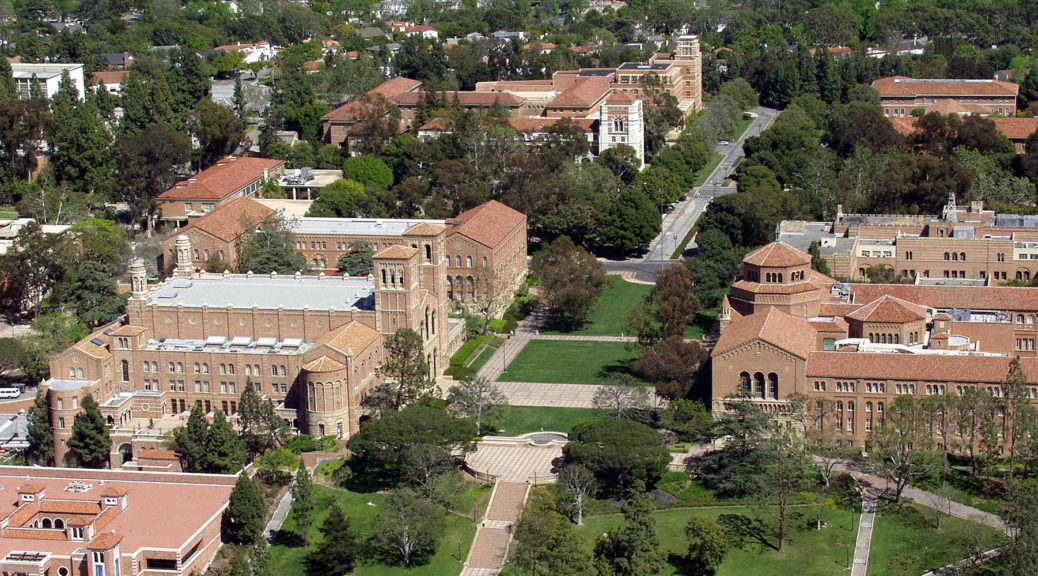
Linked from Colleges and trainings
1. Describe the learning setting. Include where it took place, the role of other persons who were involved with you, and any materials and methods employed which assisted your learning.
The University of California at Los Angeles is located in Westwood. I went there for a semester in 1964, after dropping out of Stanford for the first time, living with my parents in Canoga Park while I attended. Then I came back in the autumn of 1973, while living at the Zen Center and working as a stagehand. Other people involved included professors and fellow students. In 1964 I was in a car pool of high school friends. In 1973 I was in a car pool of fellow students from the Zen Center, so both times I had a small group of friends on that large campus. The methods are the familiar huge lectures of the state university, and some smaller classes and sections where you can have a little bit of contact with your professors and his assistants.
2. Describe your participation and responsibilities in this setting.
In 1964 I took a broad range of beginning courses, and mostly just sat in huge lecture halls taking notes, which I memorized for the exams. My grades were directly proportional to how accurately I had memorized the notes and reading: 2 As, 2 Bs, and 2 Cs. My responsibilities outside the classroom were minimal, as I was living at home with my parents, and all my time was spent poring over the materials that were being poured into me.
In 1973 the situation was somewhat different. I was going to school three days a week and picking up stagehand work the other two or three. I was responsible for supporting myself, but still found it possible to follow the memorization pattern of 1964, this time getting two As and a B. I was taking three beginning lectures in the Geography-Ecosystems major.
3. Describe new skills and/or knowledge derived from this learning activity which contribute to your Degree Plan.
In 1964 I took courses in General Anthropology (Evolution to Early Man), Beginning Latin, Principles of Economics, Survey of English Literature, and History of Greek Philosophy. I was still shopping for a major. I found that only the philosophy course was easy and exciting for me.
In 1973 I took Principles of Biology, Introduction to Physical Geography, and Man and the Earth Ecosystem
4. Self-Assessment: Evaluate this learning activity. Monitor such things as the quality of the experience itself and its personal significance to you.
As large state universities go UCLA is probably a good one, but I found all classroom learning there very superficial. Of course I was only taking introductory and survey courses, which are of themselves superficial. I reacted strongly to the immensity of the factory school both times. I can remember sitting under a tree on the campus in 1964 and longing to find a guru from whom I could learn all that was important without going through this incredible labyrinth of people and buildings.
In 1973 the campus seemed more like a parking structure than a school. I was by now ten years older than everybody else in my introductory classes, and I was deciding that if I wanted a psychological education it would be much better in a situation where I would be taking courses with my peers and covering material that was at least as sophisticated as all the independent reading I had done.
Also, at this time I was trying out an ecology major, trying to decide between Buddhist studies, psychology, and ecology. I could find no way to combine them, although I am equally interested in all three. I found the milieu of the Geography-Ecosystems department at UCLA not to my taste because there was no consideration for the psychological and spiritual life of man, which is for me intimately tied up with how we choose to use our resources.
5. Describe the methods of evaluation and feedback used during the learning experience itself.
Midterm and final exams, grades on papers, and midterm and final grades. Also, the professors or their assistants are usually available for discussion during their office hours.
6. Describe the material products of this learning experience, if any.
None.
7. List the forms of testimony and evaluation that you will include in your portfolio as demonstrable evidence of learning. Please attach these.
Transcript from UCLA
Working toward a shared planetary consciousness that heals the Earth
